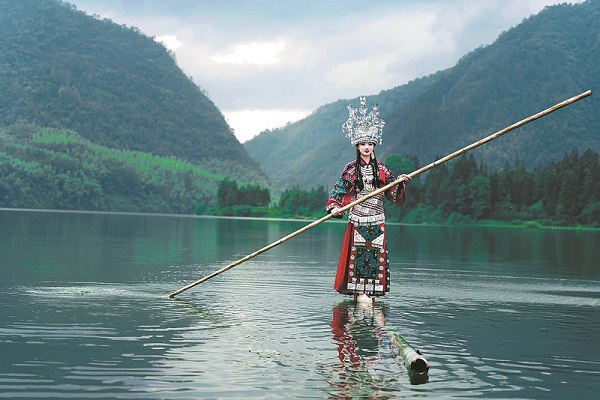Deputy breathes new life into traditional bamboo industry

Yang Liu drifts on a bamboo pole while balancing herself with another on a lake in the Chishui Bamboo Sea in Zunyi, Guizhou province. [Photo provided to China Daily]
In the serene mornings of Chishui, a county-level city in Zunyi, Guizhou province, local resident Yang Liu can often be found honing her skills in the art of bamboo drifting among the flowing rivers that wind through bamboo forests. With a long bamboo pole in hand and poised gracefully on another pole, she navigates the waters with finesse, showcasing the beauty of this traditional folk sport.
Through the sharing of her videos on social media, Yang, a recognized inheritor of the national intangible cultural heritage of Chishui single bamboo drifting, introduces the enchanting allure of the Chishui Bamboo Sea to a broader domestic and international audience.
Located in the northern part of Guizhou, the "sea of bamboo" covers 88,500 hectares. The bamboo forests paint a picturesque green landscape that captivates the eye and provides significant economic benefits to drive rural vitalization.
Last year, the total output value of the bamboo industry in Chishui reached 8.31 billion yuan ($1.16 billion), with bamboo-related income accounting for approximately 65 percent of the city's GDP.
Local authorities, as reported by Guizhou Daily, are dedicated to promoting sustainable cultivation and harvesting methods to preserve the ecological balance of the bamboo sea. Each year, approximately 15 million bamboo poles and 1 million metric tons of miscellaneous bamboo items are harvested in Chishui, involving 180,000 bamboo farmers.
They can earn over 5,000 yuan per person annually through the sale of bamboo raw materials and engagement in related industries.
Yang Changqin, a National People's Congress deputy and a sixth-generation inheritor of the provincial intangible cultural heritage Chishui bamboo-weaving, has elevated traditional bamboo weaving to a fusion of practicality and artistic aesthetics.
Through innovative designs, she has expanded the range of bamboo products to weaving accessories, fiber paintings, art lamps and more.
"Development is the best form of inheritance. We must innovate products that align with contemporary aesthetic standards and integrate them into daily life scenarios, possessing commercial attributes to better promote inheritance and development," she said.
In 2019, Yang established Jizhutang, a base for the production, research, design, apprentice training, experiential learning and sales of intangible cultural heritage bamboo-weaving in Datong town, Chishui.
The base has uplifted the livelihoods of over 2,000 individuals, helping increase their average annual income by over 30,000 yuan.
Led by individuals such as Yang Changqin, Lu Huaying and Ma Qiang, the bamboo craft inheritors in Chishui have propelled the evolution of traditional bamboo craftsmanship toward contemporary bamboo paintings, handbags, carvings and landscape fans.
These creative products are distributed globally, enhancing the reputation of the Chishui Bamboo Sea.



